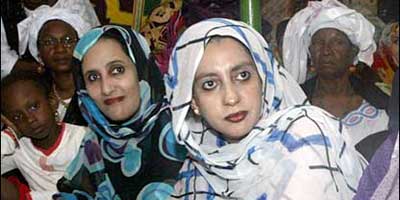Human Rights of Women
Many Mauritanian women and their families are now stipulating the one-wife as a prerequisite before marriage, but religious scholars have condemned it as a violation to Islamic teaching.
 Many of the Mauritanian women now insist on including a condition in the marriage contract that prevents the husband from keeping a previous wife or taking a new one. In case the husband violates this condition, the woman becomes entitled to file an immediate divorce.
Many of the Mauritanian women now insist on including a condition in the marriage contract that prevents the husband from keeping a previous wife or taking a new one. In case the husband violates this condition, the woman becomes entitled to file an immediate divorce.
For many parents, this restriction has become one of the most important conditions while negotiating marriage details with a suitor since they believe it is the key to their daughter’s happiness and marital stability.
VAW rare in Mauritania
Human rights monitors and female lawyers in Mauritania report that physical mistreatment of women by their husbands is rare.
The police and judiciary occasionally intervene in domestic abuse cases but women in traditional society rarely seek legal redress, relying instead upon family and ethnic group members to resolve domestic disputes.
The incidence of reported rape is also low.
Mauritanian women give up a lot of their rights in order to talk the groom into accepting the condition of not having another wife, said Fatima who insisted on this condition in her current and previous marriage.
"In order to be granted that right we neither ask for big dowries nor a divorce settlement," she told AlArabiya.net. "We also don’t care about the apartment, furniture or the honeymoon."
Several women in Mauritania even stay with their families after marriage to give their husbands a chance to accumulate money to buy apartments ready at their own convenience.
"We make all these sacrifices in order to preserve our dignity."
Fatima added that this practice, even though considered unusual in the beginning, has earned Mauritania a lot of praise in the region.
"Arab and African women who visited Mauritania were impressed and several neighboring countries started imitating us like Morocco and Senegal."
Human rights organizations hailed this practice as a positive step towards granting Mauritanian women more rights, and praised the government for instructing the Civil Rights Authority to give women the right to set this condition in the marriage contract.
Fatwa against FGM
A 2007 study showed that 72 percent of women in Mauritania had undergone FGM.
However a recent fatwa banning female genital mutilation/cutting in Mauritania will help reduce the practice - if religious leaders take the message to the people, scholars and anti-FGM/C activists say.
There is a belief that GGM/C is part of Islamic culture and some families cut their girls "as Allah wishes"
ISLAMIC SCHOLARS DISAGREE
On the other hand, several religious scholars in Mauritania slammed the condition and considered it as violation of Islamic laws that give men the right to take up to four wives.
This condition, they argue, has a negative impact on society since it will increase divorce rates whether in making the man leave his previous wife or in giving the woman the right to divorce if the husband remarries.
Some scholars say that a woman and her future husband can verbally agree that he does not remarry without writing this condition on the marriage contract.
The "verbal contract" they justify it is that women can change their minds later on by deciding on not wanting to have a divorce if their husbands take second wives.
However, few scholars sanction the condition as long as the husband agrees to abide by this commitment.
MEN's WAY OUT
Despite the fact that a considerable portion of Mauritanian men agree not to have another wife, there is always a way of going around it. Some men divorce the first wife then take her back after marrying the second one.
Other men remarry in secret taking advantage of the social conditions that lead several Mauritanian women to accept a secret marriage. Divorced and unmarried women agree to marry a married man in secret believing that their marriage prospects are diminishing as they get older.
Poor families also agree to marry their girls to rich married men in secret since the future husband usually provides for the entire family. Sometimes a woman would know that her husband violated the condition and would pretend not to and not ask for divorce. This especially applies to upper classes where women care about their social image and prefer not to announce that their husbands remarried in secret.
WHEN IT STARTED
Scholars disagree as to when the anti-polygamy condition started to be applied.
According to Mauritanian traditions, most pre-nuptial agreements were made verbally in the presence of several witnesses from both families.
The man, for example, would pledge to treat his wife well and never to leave her and sometimes would commit to household details like bringing her a maid and so on.
Sometimes parents would set religious conditions that make the husband ensure that his wife practices her rituals on regular basis. For example, the husband can pledge to wake his wife up every day when it’s time for dawn prayers.
Marriage conditions have undergone remarkable changes as women started gaining more rights in Mauritania. For example, a woman would demand that she continues her education and/or work after marriage even if she has children.
